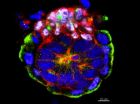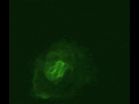(Press-News.org) We know much about how embryos develop, but one key stage – implantation – has remained a
mystery. Now, scientists from Cambridge have discovered a way to study and film this 'black box'
of development. Their results – which will lead to the rewriting of biology text books worldwide
– are published in the journal Cell.
Embryo development in mammals occurs in two phases.
During the first phase, pre-implantation, the embryo is a small, free-floating ball of cells
called a blastocyst. In the second, post-implantation, phase the blastocyst embeds itself in the
mother's uterus.
While blastocysts can be grown and studied outside the body, the same
has not been true from implantation. And because embryos are so closely connected to their
mothers, implantation has also been difficult to study in the womb.
According to study
author Professor Magdalena Zernicka-Goetz of the University of Cambridge: "We know a lot about
pre-implantation, but what happens after implantation – and particularly the moment of
implantation – is an enigma."
Scientists are interested in studying implantation because
the embryo undergoes huge changes in such a short space of time.
"During these two days,
it goes from a relatively simple ball to a much larger, more complex cup-like structure, but
exactly how that happens was a mystery – a black box of development. That is why we needed to
develop a method that would allow us to culture and study embryos during implantation," she
explained.
Working with mouse cells, Professor Zernicka-Goetz and her colleague Dr Ivan
Bedzhov succeeded in creating the right conditions outside the womb to study the implantation
process.
To be able to support development, they created a system comprising a gel and
medium that, as well as having the right chemical and biological properties, was of similar
elasticity to uterine tissue. Crucially, this gel was transparent to optical light, allowing
then to film the embryo during implantation.
VIDEO:
The mouse embryo's own stem cells organize themselves into a rosette-like arrangement as a pre-requisite for laying the foundations for the body when the embryo would implant into the...
Click here for more information.
This new method revealed that on its way
from ball to cup, the blastocyst becomes a 'rosette' of wedge-shaped cells, a structure never
before seen by scientists.
"It's a beautiful structure. This rosette is what a mouse
looks like on the 4th day of its life, and most likely what we look like on the 7th day of ours,
and it's fascinating how beautiful we are then, and how these small cells organise so perfectly
to allow us to develop."
As well as answering a fundamental question in developmental
biology, the new method will allow scientists to study embryo growth and development at
implantation for the first time, which could help improve the success of IVF, and extend our
knowledge of stem cells, which could advance their use in regenerative medicine.
The
findings also mean developmental biology text books will need rewriting. "The text books make an
educated guess of what happened during this part of development, but we now know that what I
learned and what I teach my students about this was totally wrong," said Professor
Zernicka-Goetz.
INFORMATION: END
Rewriting the text books: Scientists crack open 'black box' of development
2014-02-14
ELSE PRESS RELEASES FROM THIS DATE:
A role of glucose tolerance could make the adaptor protein p66Shc a new target for cancer and diabetes
2014-02-14
[TORONTO,Canada, Feb 18, 2014] – A protein that has been known until recently as part of a complex communications network within the cell also plays a direct role in regulating sugar metabolism, according to a new study published on-line in the journal Science Signaling (February 18, 2014).
Cell growth and metabolism are tightly controlled processes in our cells. When these functions are disturbed, diseases such as cancer and diabetes occur. Mohamed Soliman, a PhD candidate at the Lunenfeld Tanenbaum Research Institute at Mount Sinai Hospital, found a unique role for ...
IBEX research shows influence of galactic magnetic field extends beyond our solar system
2014-02-14
In a report published today, new research suggests the enigmatic "ribbon" of energetic
particles discovered at the edge of our solar system by NASA's Interstellar Boundary Explorer (IBEX)
may be only a small sign of the vast influence of the galactic magnetic field.
IBEX researchers have sought answers about the ribbon since its discovery in 2009. Comprising
primarily space physicists, the IBEX team realized that the galactic magnetic field wrapped around
our heliosphere — the giant "bubble" that envelops and protects our solar system — appears to
determine the orientation ...
Rebuilding the brain after stroke
2014-02-14
DETROIT – Enhancing the brain's inherent ability to rebuild itself after a stroke with molecular
components of stem cells holds enormous promise for treating the leading cause of long-term
disability in adults.
Michael Chopp, Ph.D., Scientific Director of the Henry Ford Neuroscience Institute, will present
this approach to treating neurological diseases Thursday, Feb. 13, at the American Heart
Association's International Stroke Conference in San Diego.
Although most stroke victims recover some ability to voluntarily use their hands and other body
parts, half are ...
Amidst bitter cold and rising energy costs, new concerns about energy insecurity
2014-02-14
February 13,2014 --With many regions of the country braced by an unrelenting cold snap, the problem of energy insecurity continues to go unreported despite its toll on the most vulnerable. In a new brief, researchers at Columbia University's Mailman School of Public Health paint a picture of the families most impacted by this problem and suggest recommendations to alleviate its chokehold on millions of struggling Americans. The authors note that government programs to address energy insecurity are coming up short, despite rising energy costs.
Energy Insecurity (EI) is ...
Harvard scientists find cell fate switch that decides liver, or pancreas?
2014-02-14
Harvard stem cell scientists have a new theory for how stem cells decide whether to become
liver or pancreatic cells during development. A cell's fate, the researchers found, is determined by
the nearby presence of prostaglandin E2, a messenger molecule best known for its role in
inflammation and pain. The discovery, published in the journal Developmental Cell, could potentially
make liver and pancreas cells easier to generate both in the lab and for future cell therapies.
Wolfram Goessling, MD, PhD, and Trista North, PhD, both principal faculty members of the
Harvard ...
Arctic biodiversity under serious threat from climate change according to new report
2014-02-14
Unique and irreplaceable Arctic wildlife and landscapes are crucially at risk due to global warming caused by human activities according to the Arctic Biodiversity Assessment (ABA), a new report prepared by 253 scientists from 15 countries under the auspices of the Conservation of Arctic Flora and Fauna (CAFF), the biodiversity working group of the Arctic Council.
"An entire bio-climatic zone, the high Arctic, may disappear. Polar bears and the other highly adapted organisms cannot move further north, so they may go extinct. We risk losing several species forever," says ...
Pregabalin effectively treats restless leg syndrome with less risk of worsening symptoms
2014-02-13
A report in the Feb. 13 New England Journal of Medicine confirms previous studies suggesting that long-term treatment with the type of drugs commonly prescribed to treat restless leg syndrome (RLS) can cause a serious worsening of the condition in some patients. The year-long study from a multi-institutional research team found that pregabalin – which is FDA-approved to treat nerve pain, seizures, and other conditions – was effective in reducing RLS symptoms and was much less likely to cause symptom worsening than pramipexole, one of several drugs that activate the dopamine ...
Environment change threatens indigenous know-how
2014-02-13
The way indigenous cultures around the globe use
traditional medicines and pass on knowledge developed over centuries is directly linked to the
natural environment, new research has found. This makes indigenous cultures susceptible to
environmental change, a threat that comes on top of the challenges posed by globalisation.
"Traditional medicine provides health care for more than half the world's population, with 80 per
cent of people in developing countries relying on these practices to maintain their livelihood. It
is a very important part of traditional knowledge," ...
Understanding the basic biology of bipolar disorder
2014-02-13
Scientists know there is a strong genetic component to bipolar disorder, but they have had an
extremely difficult time identifying the genes that cause it. So, in an effort to better
understand the illness's genetic causes, researchers at UCLA tried a new approach.
Instead of only using a standard clinical interview to determine whether individuals met the
criteria for a clinical diagnosis of bipolar disorder, the researchers combined the results from
brain imaging, cognitive testing, and an array of temperament and behavior measures. Using the
new method, ...
Most people have access to stroke care, but few get recommended treatment
2014-02-13
Four out of five people in the United States live within an hour's drive of a hospital equipped to treat acute stroke — yet very few get recommended treatment, according to research presented at the American Stroke Association's International Stroke Conference 2014.
Of the more than 370,000 Medicare stroke claims for 2011 that researchers examined:
Only 4 percent received tPA, a drug that can reduce disability if given intravenously within three to four hours after the first stroke symptoms.
Only 0.5 percent had endovascular therapy to reopen clogged arteries.
These ...





